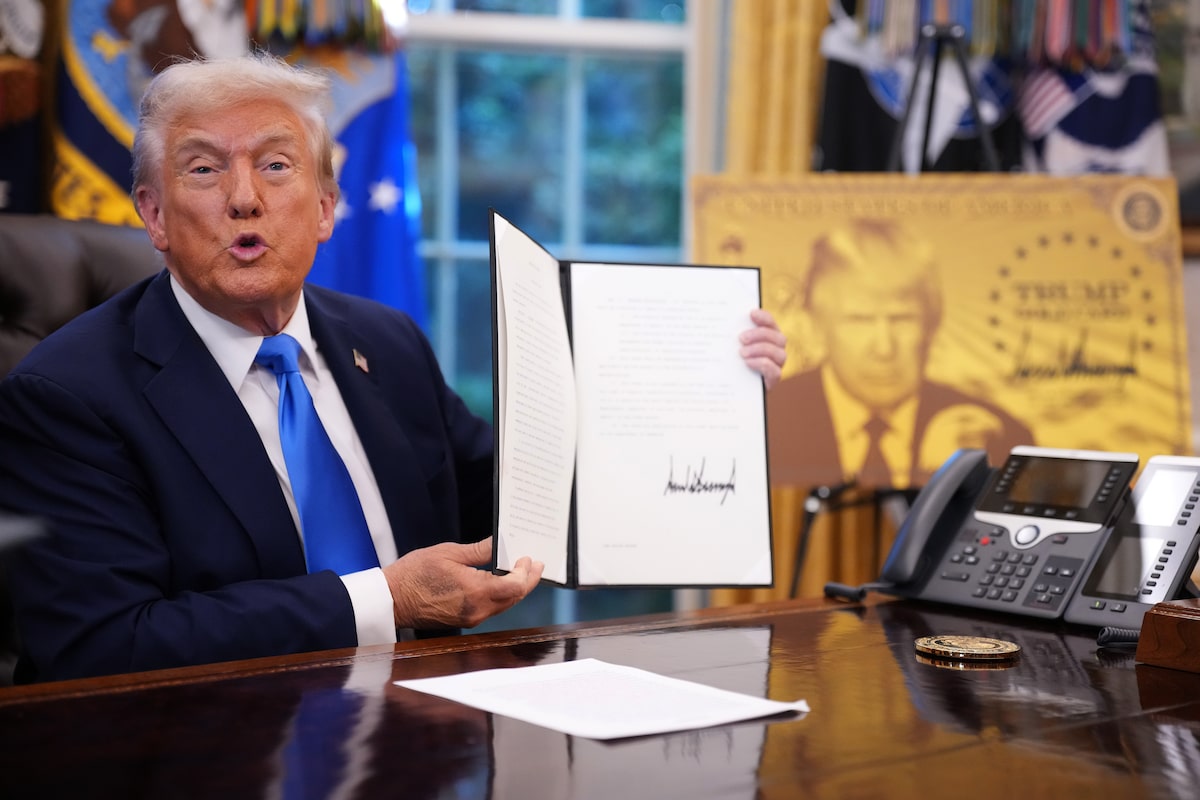President Donald Trump holds up an executive order at the White House. He signed a proclamation on Friday that requires companies to pay a fee of US$100,000 for an H-1B visa.Andrew Harnik/Getty Images
The U.S. government’s decision to impose hefty fees for H-1B visas may help Canadian businesses recruit foreign talent, but experts say Ottawa should reform some of its immigration policies to help employers take full advantage.
President Donald Trump signed a proclamation on Friday that requires companies to pay a fee of US$100,000 for an H-1B visa as the White House accuses businesses of hiring foreign workers over Americans because they can pay them less. Companies, particularly those in the tech field, rely on the work permit to hire foreign workers in specialty occupations.
Opinion: Trump’s H1-B visa price hike is good for Canada
Trump administration imposes $100,000 annual fee for H-1B visas
Experts and stakeholders expect the steep fee for H-1B visas may shut out some workers from the U.S. market and spark a global competition for top talent. For Canada to be well positioned, they say, the government needs to facilitate a smooth immigration process for those workers, including a predictable path to permanent residency.
“Anything that makes it more challenging for highly skilled workers to go to the U.S. means that there’s an opportunity for not only Canada, but for other countries to be a more attractive place for them to go to,” said Benjamin Bergen, president of the Council of Canadian Innovators.
Mr. Bergen said the Temporary Foreign Worker Program’s Global Talent Stream is the right mechanism to bring those workers in, and that the government should examine how it can further streamline that process.
Mikal Skuterud, an economics professor at the University of Waterloo specializing in immigration policy, said it’s ironic that there have been recent calls for the federal government to shutter the TFW program, given that would be the easiest way for businesses to recruit foreign talent shut out of the United States.
Conservative Leader Pierre Poilievre recently called for shutting down the TFW program and proposed creating a separate program for recruiting temporary agricultural workers. B.C. Premier David Eby has said the TFW program needs to be overhauled or scrapped.
Many economists also see a need to significantly scale back the low-wage stream of the TFW program, but Prof. Skuterud argues that the high-wage stream is beneficial for bringing in the best and brightest, quickly.
“The punchline of all this is, it really does make it very clear that this is not a program you want to entirely shut down. There are parts of the Temporary Foreign Worker Program that we want to lean in on even more, I would say,” Prof. Skuterud said.
Canada has in the past tried to go after talented workers destined for the U.S., and the latest move by the Trump administration has reignited that drive. Ravi Kahlon, British Columbia’s Minister for Jobs and Economic Growth, reacted to Mr. Trump’s move by inviting workers to his province instead.
“We’re inviting tech talent, innovators, and scientists to come to B.C. and be part of building the economic engine of Canada’s new economy!” Mr. Kahlon posted on social media on Saturday.
Jaxson Khan, a former policy adviser for Industry, Science and Economic Development Canada, said that well-funded U.S. tech companies can afford to pay the additional fee, and are already spending huge amounts of money to attract top talent from abroad, particularly experts in artificial intelligence and quantum computing.
(The fee also applies at the discretion of the Secretary of Homeland Security, according to the White House, and it can be waived if the hire is in the national interest.)
Still, Mr. Khan said, it is an opportunity for Canada to woo international talent, such as by setting up an equivalent program targeted at those applying for H-1B visas. The federal government did so in 2023, while Mr. Khan was an adviser, and received 10,000 applicants within 48 hours.
According to a report from the Washington-based Niskanen Center, only 1,205 workers arrived during the first year, suggesting Canada was viewed as a backup option.
“That’s still 1,200 people we didn’t have before,” said Mr. Khan, now chief executive of advisory firm Aperture AI.
Meika Lalonde, a partner at McCrea Immigration Law, said ensuring that high-skilled workers can easily transition to permanent residency will be essential if Canada wants to poach U.S.-bound workers and benefit from their talents long-term.
“In order for them to stay here long-term and actually bring enormous benefits to Canada through their skills and their education, we − and by we, I mean the Canadian government really has to make some fundamental changes to our permanent-residence programs to ensure that people are attracted here,” Ms. Lalonde said, adding that the influx in temporary residents has increased competition for permanent residency.
Ms. Lalonde said the federal government’s introduction of categories-based selection for permanent residency has also made it harder for high-skilled workers to make the transition. That’s because the government is choosing applicants based on their profession, as well as French-language proficiency.
While the U.S.’s new policy on H-1B visas may seem like an opportunity to some, others see a risk. Canadian Senator Colin Deacon said he’s concerned that American businesses may now choose to hire even more of Canada’s top talent, given that Canadian workers are eligible for a work permit under the United States-Mexico-Canada Agreement.
“We need to consider the fact that this could disadvantage keeping really great talent in Canada, because what it means is that somebody going to the United States requiring an H1-B visa will cost U.S. firms $100,000 a year more. But that won’t be the case for Canada,” Mr. Deacon said.

